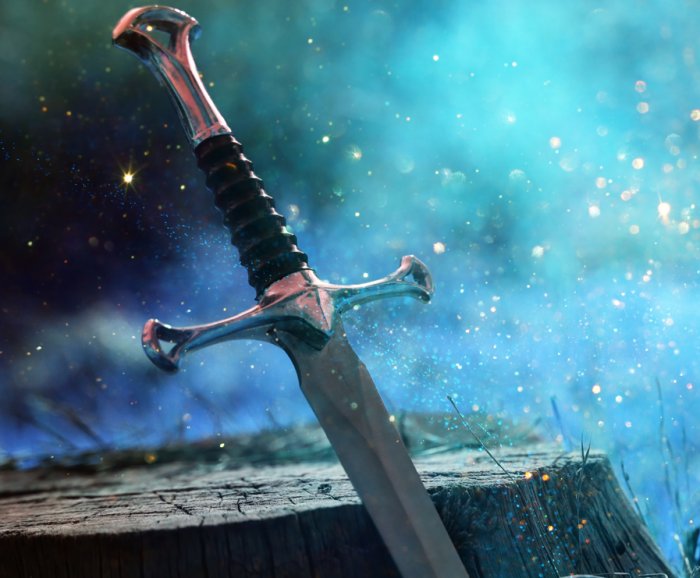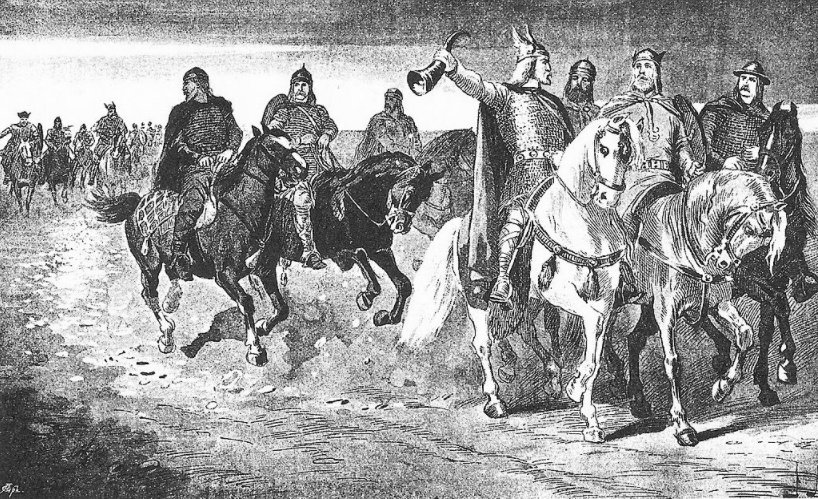Skofnung – Formidable Sword With Supernatural Powers That Belonged To Legendary Danish King Hrólf Kraki
A. Sutherland - AncientPages.com - In ancient Norse beliefs, weapons had a magical power, and many myths and legends of Scandinavia are devoted to gods, heroes, and formidable weapons.
One such weapon was 'Skofnung, 'considered "the best of all swords carried in northern lands."
"Skofnung was a mysterious sword with powerful qualities." Image credit: tomertu - Adobe Stock
Skofnung was a mysterious sword with powerful qualities such as supernatural sharpness and hardness. It belonged to the legendary Hrólf Kraki, the Danish king who appears in the Saxon story of Beowulf.
Hrólf Kraki is known from the transmissions and sagas. He is mentioned in the traditions of both Anglo-Saxon and Scandinavian. The Lord is mentioned in the anonymous Chronicle of the Kings of Lejre (the Chronicles Chronicon Lethrense), Gesta Danorum (deeds of the Danes by Saxo Grammar), The Old English epic heroic poem Beowulf and the Icelandic saga Hrólfs saga kraka.
Some of the information about Rolf Krake in these sources is consistent, but several threads and messages are cited in other, less consistent sources. For this reason, the knowledge of this enigmatic ruler cannot be derived from only one source.
Heoroweard and Hrólfr Kraki, by Jenny Nyström (1895).
Whether King Kraki was, a real person or a legendary one is unknown.
In "The Epic Hero," Dean A. Miller says that the sword Skofnung is mentioned in one of the Icelandic sagas dated to the 13th century, "Laxdela Saga." It was unearthed in a mound containing the grave of King Kraki.
Skofnung also contains the spirits of the king's 12 most trustworthy berserker bodyguards. It is the hardest and sharpest of all the swords in the lands of the North.
The marvelous, mysteriously enhanced Skofnung can cause serious wounds that sometimes cannot be healed, but it also has a healing stone attached to it capable of curing the wounds inflicted by the sword.
 Hrólfr Kraki wielding (possibly) Skofnung. Frolich, 1850.Hrolf's death. Lorenz Frølich —Alf Henrikson (1985) Ända från Vendelkråka. p. 21 Illustration of legendary king. Public Domain
Hrólfr Kraki wielding (possibly) Skofnung. Frolich, 1850.Hrolf's death. Lorenz Frølich —Alf Henrikson (1985) Ända från Vendelkråka. p. 21 Illustration of legendary king. Public Domain
One story in the Laxdela Saga tells that the Skofnung sword was used to "avenge a kin slaying. However, although the hero duels with and wounds the man involved in the killing, he also – [simultaneously] heals his opponent's injury with the healing stone, and the two men end the conflict and become true friends.
Another exciting remark regarding Skofnung is that "…the sun must never shine on its hilt, and it must never be drawn in the presence of a woman."
Could this weapon be only used in the darkness, at night? Does it mean that a woman in the vicinity of this weapon can somehow contaminate it and reduce its supernatural power?
Hrólfr Kraki spreading gold to escape the Swedes, by Jenny Nyström (1895)
The sword Skofnung has a long history that spans about 500 years after the king.
Some of Skofnung's adventures are described in "The Book of Settlements" (Landnámabók), an ancient Icelandic text that dates back to the 12th/13th century and deals with Iceland's first settlers.
One story in the book tells about Iceland's indigenous settler, who, around the year 900, opened an ancient grave mound. It was the grave of King Hrolf and his warriors; the name of this colonist and the grave robber was Skeggi of Midfjord.
Before Skeggi arrived in Iceland, he was a Viking in the Baltic and grave robber regions. Skeggi managed to escape with Skofnung and several other priceless goods.
Later, the weapon was used by others and even taken on a pilgrimage to Rome. Still, when its possessor died on his way home (c. 1073) and was buried at Roskilde, Denmark – knowledge of the weapon's whereabouts was forever lost.
Written by – A. Sutherland AncientPages.com Staff Writer
Updated on January 22, 2024
Copyright © AncientPages.com All rights reserved. This material may not be published, broadcast, rewritten or redistributed in whole or part without the express written permission of AncientPages.com
More From Ancient Pages
-
 Well-Preserved 1,000-Year-Old Ulfberht Sword Found In The Wisla River, Poland
Archaeology | Jan 23, 2024
Well-Preserved 1,000-Year-Old Ulfberht Sword Found In The Wisla River, Poland
Archaeology | Jan 23, 2024 -
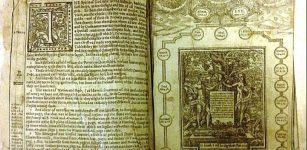 On This Day In History: The King James Bible Is Published For The First Time In London – On May 2, 1611
News | May 2, 2016
On This Day In History: The King James Bible Is Published For The First Time In London – On May 2, 1611
News | May 2, 2016 -
 Unlocking The Secrets Of Lost Prehistoric Land Hidden Beneath The Sea
News | Sep 8, 2015
Unlocking The Secrets Of Lost Prehistoric Land Hidden Beneath The Sea
News | Sep 8, 2015 -
 Extremely Rare And Tiny Biblical Coins Discovered Near The Temple Mount
Archaeology | May 30, 2018
Extremely Rare And Tiny Biblical Coins Discovered Near The Temple Mount
Archaeology | May 30, 2018 -
 Did Lead Poisoning Cause The Fall Of The Roman Empire?
Archaeology | Oct 24, 2017
Did Lead Poisoning Cause The Fall Of The Roman Empire?
Archaeology | Oct 24, 2017 -
 Celtic Valhalla And Sacred Wells – Magic Of Invisible Worlds
Celtic Mythology | Nov 17, 2021
Celtic Valhalla And Sacred Wells – Magic Of Invisible Worlds
Celtic Mythology | Nov 17, 2021 -
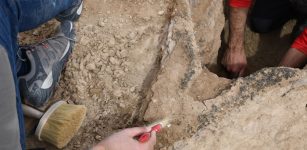 Unique, Well-Preserved 4,000-Year-Old Boat Discovered Near The Ancient City Of Uruk
Archaeology | Apr 4, 2022
Unique, Well-Preserved 4,000-Year-Old Boat Discovered Near The Ancient City Of Uruk
Archaeology | Apr 4, 2022 -
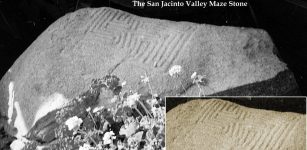 Baffling Prehistoric Maze Stones In Hemet And San Jacinta Valley, California
Ancient Symbols | Jun 24, 2016
Baffling Prehistoric Maze Stones In Hemet And San Jacinta Valley, California
Ancient Symbols | Jun 24, 2016 -
 Is There A Hidden Ancient Message Inside San Miniato Al Monte Basilica?
Featured Stories | Oct 3, 2022
Is There A Hidden Ancient Message Inside San Miniato Al Monte Basilica?
Featured Stories | Oct 3, 2022 -
 Hidden Inca Water System Beneath The Machu Picchu Jungle Discovered By LIDAR
Archaeology | Mar 11, 2022
Hidden Inca Water System Beneath The Machu Picchu Jungle Discovered By LIDAR
Archaeology | Mar 11, 2022 -
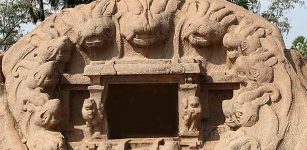 Tiger Cave: Rock-Cut Hindu Temple Complex Dated To East India’s Pallava Empire
Featured Stories | Jan 19, 2017
Tiger Cave: Rock-Cut Hindu Temple Complex Dated To East India’s Pallava Empire
Featured Stories | Jan 19, 2017 -
 Mystery Of The Bizarre Dark Figure Vanishing Into Thin Air Seen By Hotel Guests And Staff
Featured Stories | Mar 15, 2019
Mystery Of The Bizarre Dark Figure Vanishing Into Thin Air Seen By Hotel Guests And Staff
Featured Stories | Mar 15, 2019 -
 Nakanishi Ruins: One Of Japan’s Largest Ruins Discovered In Nara
Civilizations | Aug 22, 2015
Nakanishi Ruins: One Of Japan’s Largest Ruins Discovered In Nara
Civilizations | Aug 22, 2015 -
 Evidence Of Advanced Military Robots In The Ancient World – Unknown High-Tech Examined
Ancient Technology | Jan 13, 2021
Evidence Of Advanced Military Robots In The Ancient World – Unknown High-Tech Examined
Ancient Technology | Jan 13, 2021 -
 Wanyūdō The Soultaker – Fearsome Yōkai In Japanese Mythology
Featured Stories | Nov 22, 2017
Wanyūdō The Soultaker – Fearsome Yōkai In Japanese Mythology
Featured Stories | Nov 22, 2017 -
 Extraordinary Discovery Of First Viking Tower In Viborg, Denmark Re-Writes Viking History
Archaeology | Jan 30, 2017
Extraordinary Discovery Of First Viking Tower In Viborg, Denmark Re-Writes Viking History
Archaeology | Jan 30, 2017 -
 Secrets Of A Lake That Could Re-Write Ancient History Of America – Ancient Visitors From Distant Countries – Part 3
Civilizations | Jun 6, 2018
Secrets Of A Lake That Could Re-Write Ancient History Of America – Ancient Visitors From Distant Countries – Part 3
Civilizations | Jun 6, 2018 -
 Yakhchals: Ingenious Ancient ‘Refrigerators’ Could Store Ice In The Hot Desert
Ancient Technology | Sep 15, 2018
Yakhchals: Ingenious Ancient ‘Refrigerators’ Could Store Ice In The Hot Desert
Ancient Technology | Sep 15, 2018 -
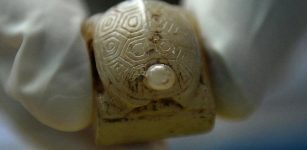 Rich 2,000-Year-Old Chinese Tomb May Reveal Secret Identity Of Its Owner
Archaeology | Dec 18, 2015
Rich 2,000-Year-Old Chinese Tomb May Reveal Secret Identity Of Its Owner
Archaeology | Dec 18, 2015 -
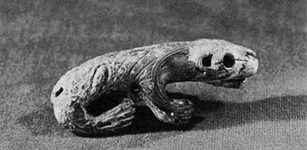 Ancient City Of Ipiutak Was Built By A Fair-Haired Race With Blue Eyes And Not Us – The Inuit Say
Featured Stories | Apr 23, 2019
Ancient City Of Ipiutak Was Built By A Fair-Haired Race With Blue Eyes And Not Us – The Inuit Say
Featured Stories | Apr 23, 2019

